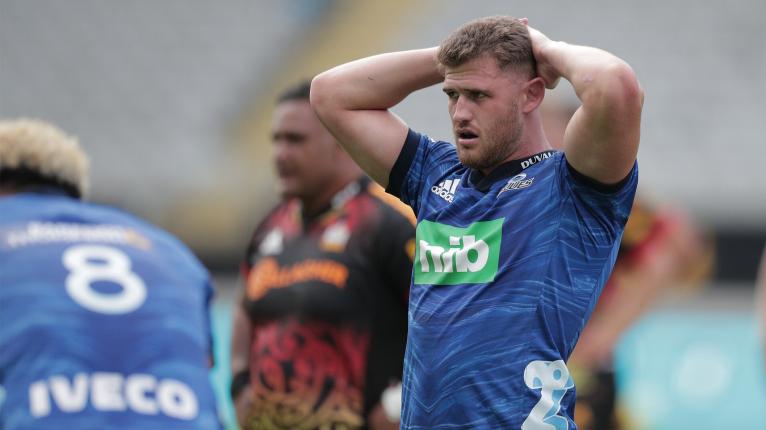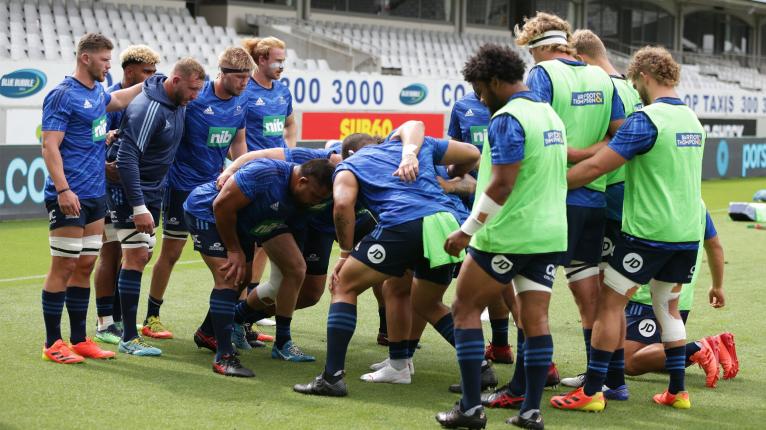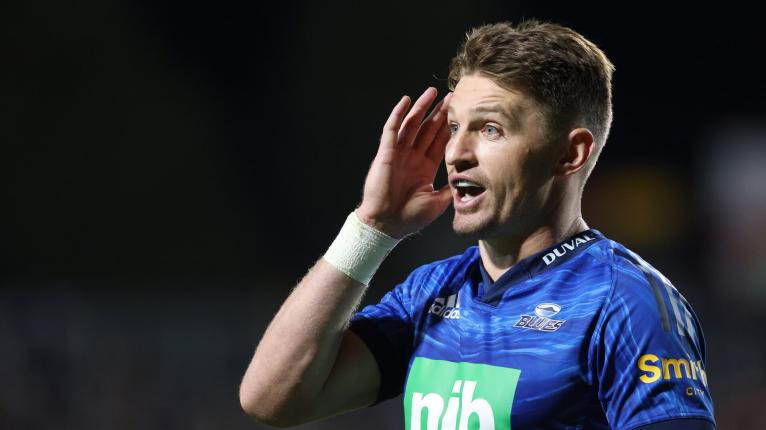Are we witnessing a shift in the power base of New Zealand rugby?
It’s a question worth raising, following the Blues’ first win over the Crusaders in Christchurch since 2004, and only their fifth victory over the Cantabrians throughout that same time period.
Of course, one swallow does not a season make and when other franchises have scored rare wins over the Crusaders (including Christchurch victories for both the Highlanders and Chiefs in the past year), rarely do we see suggestions that those teams are becoming the new superpower of NZ.
But there was a different feeling to the Blues’ victory on Friday night – not least because, in many ways, it was almost anticipated.
The Blues started the season in somewhat shaky fashion. In their opening game against the Hurricanes, they looked a million dollars for the first 70 minutes and built an 18-point lead before conceding three tries at the death to fall to a 33-32 defeat. The following week, they needed Chiefs pivot Bryn Gatland to miss an 80th-minute penalty attempt on goal to avoid another last-gasp loss.

In the weeks since, however, they’ve gone from strength to strength.
Back-to-back wins against the Highlanders were followed by back-to-back wins over Moana Pasifika and then came the rematch against the Chiefs in Hamilton. The Blues had their issues, no doubt, losing three men to the bin, but they still nilled the Chiefs for the first time in the team’s history. A good team is able to win even when the cards aren’t falling their way and the Blues will have emerged from their 25-0 victory knowing they can play a lot better, but they still had a bonus point win to crow about.
Even having to manage without the services of Beauden Barrett, Roger Tuivasa-Sheck, Nepo Lauala and Caleb Clarke for a handful of matches apiece hasn’t slowed the Blues down, while Karl Tu’inukuafe has only recently returned to action following some pre-season surgery and Akira Ioane is yet to take the field.
The Crusaders, by contrast, have been trucking along well enough, banking the points needed to stay in touch with the top of the table, but failing to impress somewhat with marginal wins over the Hurricanes and Highlanders in recent weeks, not to mention their earlier loss this year to the Chiefs in Christchurch.
Make no mistake, the Crusaders went into Friday night’s match as favourites, but there were plenty of fans and pundits alike who would have quietly quite confident of the Blues’ chances.
Undoubtedly, MacDonald has brought a bit of a Crusaders ethos to his role in Auckland, having chalked up 14 seasons with the team as a player or coach, not to mention his nine years as assistant or head coach with Tasman, operating under the Crusaders high-performance umbrella.
A huge amount of credit has to go to head coach Leon MacDonald, who has helped turned the Blues’ fortunes around since coming on board in 2019.
When MacDonald joined the Blues, they’d just come off a 14th-place finish with Tana Umaga in charge and while their fortunes didn’t immediately improve the following season, the team looked to be slowly turning a corner, scoring wins over New Zealand opposition for the first time in three years – including banking their first victory against the Chiefs since 2013.
Undoubtedly, MacDonald has brought a bit of a Crusaders ethos to his role in Auckland, having chalked up 14 seasons with the team as a player or coach, not to mention his nine years as an assistant or head coach with Tasman, operating under the Crusaders high-performance umbrella.
In his time with the team, we’ve seen prodigious youngsters such as Finlay Christie, Caleb Clarke, Hoskins Sotutu and Zarn Sullivan emerge and flourish while the development of already-known talents like Dalton Papalii and Akira Ioane has also accelerated.
It would be entirely reasonable to suggest that Papalii is now the best out-and-out openside flanker in the country – even better than All Blacks captains Sam Cane and Ardie Savea.

Obviously, some of that credit also has to go to forwards coach Tom Coventry who has transformed an ever underperforming pack into one of the most fearsome ones in the world game, even in the absence of key cogs such as Ioane, Laulala and Patrick Tuipulotu.
But, if there’s one area where the Blues have transformed themselves as a club, it’s in their recruitment.
When you bring arguably the best player in the country in one of the most influential positions into your stables, you would hope to see a marked improvement in performance.
In Beauden Barrett, the Blues have New Zealand’s premier flyhalf – any debate should be off the table after another rousing performance against the Crusaders on Friday night where the 30-year-old always kept the opposition guessing, even if some of the Blues’ game management fell by the wayside in the final 15 minutes of the piece.
Barrett was lured north from the Hurricanes ahead of the 2020 season but featured just a handful of times for the Blues prior to this year thanks to delayed starts, injuries and sabbaticals. In the time that Barrett had signed with the Blues but wasn’t actually representing them on the park, the team looked incredibly competent with Otere Black, Stephen Perofeta and Harry Plummer running the cutter, but not necessarily like the best side in the competition.
It would be remiss to suggest that the Blues have simply bought a championship team because that’s clearly not the case.
Even before Barrett joined the team, the Blues were able to bring Karl Tu’inukuafe and Nepo Laulala into the fold, recruiting them after they’d already broken into the All Blacks ranks. Add in the newest addition, former NRL superstar Roger Tuivasa-Sheck, and it’s impossible not to be impressed with the Blues’ off-season work. Even Finlay Christie was well underway in his Super Rugby career before heading to Auckland, having spent three seasons with the Chiefs and Hurricanes – although it wasn’t until he linked up with the Blues that he started attracting attention at the highest level of the game.
But it would be remiss to suggest that the Blues have simply bought a championship team because that’s clearly not the case.
In bringing some flagstone players to the franchise in the form of Barrett, Laulala and Tu’inukuafe to complement the already proven talents such as Tuipulotu, Papalii, Ofa Tuungafasi and Rieko Ioane, MacDonald and the powers that be at Blues HQ have transformed the franchise into an attractive prospect for any young, up-and-coming players – local or from further afield.
Men like Zarn Sullivan, Alex Hodgman and Soane Vikena are fully aware the Blues environment, which now boasts ample experience on both the playing and coaching spectrums, is one that can help them grow from being players simply of great potential to proven performers.

In the here and now, the Blues clearly have one of the best sides in Super Rugby. They might not go on to win Super Rugby Pacific this year – they might not even make the final – but they clearly possess the talent to do exactly that.
More importantly, they don’t appear to be a top-heavy club that will topple over and crash to the ground once superstars like Beauden Barrett inevitably call time on their careers in New Zealand in the seasons to come. The foundations are there which were almost completely absent from their last title victory in 2003 until the late 2010s, and that will prove imperative for the long-term success of the team.
The Blues may have won last year’s Super Rugby Trans-Tasman competition but Friday night’s triumph over the Crusaders in Christchurch is undoubtedly a greater achievement for the side and the kind of victory that could pave the way to a first ‘real’ title win since 2003 for the Aucklanders.
Head back to the beginning of 2019 and the Blues had gone winless against fellow New Zealand sides in 20 matches on the trot. Now, they’ve won six of their last seven encounters with the Highlanders, five of their last six with the Chiefs and four of their last six with the Hurricanes. The win against the Crusaders is just the icing on the cake.
If the Blues can maintain the kind of form they’re showing on the park at present for the weeks to come, 2022 could be remembered as the genesis of New Zealand’s newest rugby dynasty – but it’s a journey that started back when Leon MacDonald took the reins three years prior.


Comments
Join free and tell us what you really think!
Sign up for free